'Very early on, we recognised the auto industry as one of the key growth sectors. For every job it generates, 32 jobs are created elsewhere.'
Ravindra Sannareddy, the founder of Sri City speaks on why automakers and suppliers should take advantage of the many incentives on offer, speedy clearance for manufacturing plants and the smart city’s strategic location.
Located 55km north of Chennai, Sri City in the state of Andhra Pradesh is emerging as an automotive hub. Ravindra Sannareddy, the founder and managing director of Sri City speaks to Kiran Bajad on why automakers and component suppliers should take advantage of the many incentives on offer, speedy clearance for manufacturing plants and the smart city’s strategic location.
How do you see Sri City evolving and what is the road ahead?
When we conceptualised Sri City in 2008, it was not based on any India cities. We wanted to create what Shenzhen is to Hong Kong and the inspiration has come from there. I belong to this place and always wanted to develop this region. When India was getting special economic zones in 2006-07, we wanted to build a business city beyond special economic zones. This is how we modelled this project.
Today, Sri City has emerged as one of the best industrial destinations in India and is evolving into one of the best business cities. We still have some time to go to create a social infrastructure in terms of housing for employees, schools, hospitals, recreational and shopping centres, hotels and malls which will come up over a period of time. Currently, we have 140 companies from 26 countries; 90 of them are operational and have created nearly 25,000 direct skilled jobs. Foxconn, an electronics manufacturing company, makes one smartphone every second and employs close to 10,000 people.
Sri City, which is a multi-product special economic zone, a Domestic Tariff Zone (DTZ) and an approved electronic manufacturer cluster by the government, is best suited for manufacturing industries including automotive. A wide range of industries have come up due to the intrinsic advantages that Sri City offers. It is well connected by four major ports — apart from Chennai port, there are the Krishnapatnam, Ennore and Kattupalli ports within a radius of 100km.
What, in your opinion, are the key highlights of Sri City?
Sri City is spread across 7,500 acres and currently 40 percent is occupied. There are 3-4 zones within the city like a special economic zone for companies focusing on exports, domestic tariff zone, free trade warehousing zone and an electronic manufacturing cluster. We have specific enclaves like automotive and education. Going forward, we are also working on country-specific enclaves like China, Japan or Korea. We will be focusing more on developing social infrastructure like schools, colleges and hospitals. Sri City is fast emerging as a business city with a concept of work, live, learn and play which will fit the smart city concept.
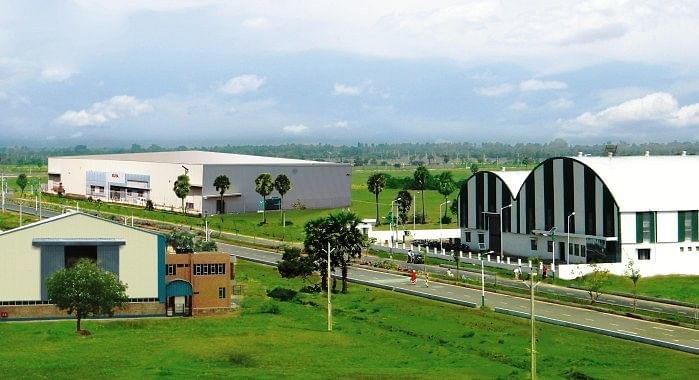
What benefits does Andhra Pradesh offer to automotive companies looking to invest in the state?
The automotive industry can be termed as the mother of the manufacturing sector in an economy as its fortunes directly impact the fortunes of several related manufacturing industries. The automobile sector in Andhra Pradesh has potential for US $1 billion output, according to a recent analysis by ACMA and the Andhra Chamber of Commerce and Industry Federation. This is one of the biggest job-creating sectors, both directly and indirectly. It is estimated that every job created in an auto company leads to three to five indirect ancillary jobs.
The Andhra Pradesh government’s aim is to develop the state into a global automobile hub and has introduced the Automobile and Auto Component Policy 2015-20. The policy aims to offer incentives to prospective investors looking to invest in the sector. This policy will immensely benefit the sector.
As the new industrial policy created by the state government supports the Make-In-India campaign, clearances and approvals are being given at a faster pace and thus factories could be operational within a span of 8-10 months.
The new state has managed to attract and sign some key players such as Isuzu Motors, Hero MotoCorp, Kalyani Steels, Ashok Leyland and Bharat Forge. Impressed by the government’s automobile policy, automotive component suppliers too are exploring the potential of investing in the state to cater to future OEM requirements.
What are the advantages that Sri City offers to automotive companies?
Very early on, we recognised the auto industry as one of the key growth sectors. For every job it generates, 32 jobs are created elsewhere, which is why we want to encourage the industry for its presence in Sri City. We have signed an MoU with Isuzu to provide adequate space for its suppliers, 18 of whom have signed the agreement. There are also some SMEs coming up. Sri City has excellent connectivity as it is located along the National Highway 5 and has broad-gauge twin railtrack connectivity. It also has four sea ports and two international airports in close proximity.
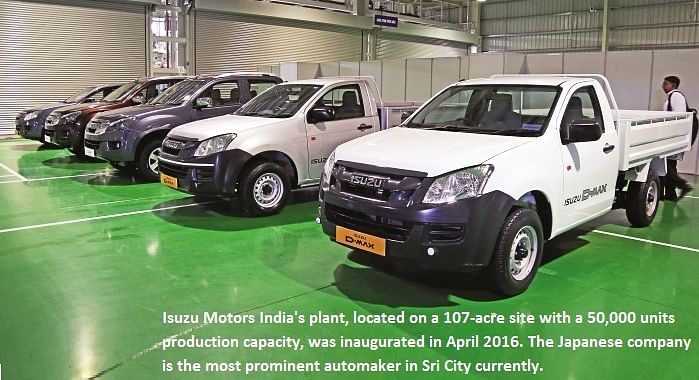
Another advantage is that major automotive zones like Chennai and Bangalore are nearby. Sri City, which is equipped with world-class infrastructure and bestowed with a locational advantage, has emerged as an auto hub and is attracting a host of OEMs and suppliers. A large land bank is available for scale-up and expansion. A big advantage is that suppliers can continue to operate from their facilities in Tamil Nadu and deliver parts to OEMs across the border.
Sri City is strategically located with multi-modal connectivity, expertise in design, function and maintenance of infrastructure, plug-and-play offices, abundant talent pool, availability of power and water, and an operational single-window clearance system for approval. An industrial area local authority, created exclusively for Sri City, gives building plant approval in less than 30 days.
Can you detail the incentives that Sri City offers the auto industry?
The Andhra Pradesh government has robust plans in place to develop the Nellore-Chittor belt into an automobile sector. The Srikalahasti-Yerpedu node is close to the urban centres of Tirupati and Nellore, the port cluster from north of Chennai to Krishnapatnam, and industrial zones in their immediate hinterland, most notably Sri City.
To attract automotive majors, the Andhra Pradesh government unveiled a new automobile policy which offers huge tax incentives and other facilities for mega integrated automobile projects with an investment of over Rs 2,000 crore, of which Rs 500 crore should come by way of an ancillary base.
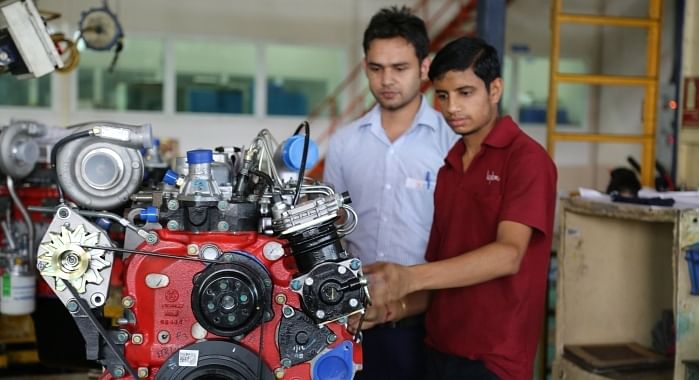
In the past 8 years, Sri City has generated nearly 25,000 direct jobs in the manufacturing sector.
The investing companies will get a gross VAT reimbursement on the sale of finished goods for a period of 20 years or 150 percent of the capital expenditure spend in the first seven years, whichever is earlier. The other tax incentives includes reimbursement of VAT in input credit for 20 years, concession in VAT rates on input and raw material and capital goods at 5 percent for 20 years, 100 percent CST reimbursement for 10 years and no entry tax or octroi to be levied on items procured by the investors. Other than this, the companies will get a reimbursement of 0.75 percent on power costs for five years besides reimbursement of stamp duty and transfer of duty on land.
Sri City also offers 24 hours’ uninterrupted power supply, adequate water supply, and six- and four-lane roads connecting the plants to the national highway. Sri City forms a unique ecosystem with a supplier park and testing laboratory.
Do you see the automotive sector making new investments in Sri City in the near future?
Yes, existing customers like Isuzu Motors have plans to expand into another phase of development. They may add a new product in this new project, which is yet to be decided. We are expecting more ancillaries to come to work here to support Isuzu’s huge demand.
Apart from this, we are in the final stage of discussions with a major Japanese diesel engine manufacturer which manufactures engines for a wide range of applications like seagoing vessels, construction equipment, fishing boats, tractors, harvester and generator sets.
We are planning to assign 1,000 acres for automotive clusters to accommodate all these units and their supply chain partners. The arrival of automotive manufacturers like Hero MotoCorp and Kia Motors in the vicinity will drive their ancillary units to come to Sri City to enhance their supply chain network operation.
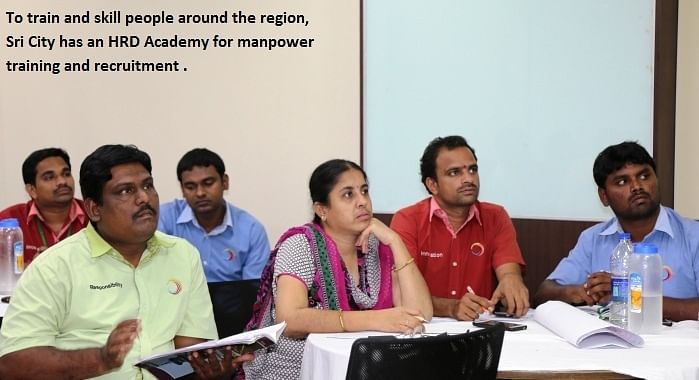
Kia Motors and Daihatsu Motors are likely to set up their manufacturing plants in India. Are you talking to them?
Kia Motors had come and visited the region but it has not yet decided on the specific site. The company may not come to Sri City but it could in some region of Andhra Pradesh. They wanted a land parcel of 400 acres but we don’t have that much land in one area.
At present, we have OEMs such as Isuzu Motors, the Kobelco Group and several Japanese automotive ancillary industries like NI Instruments, Nittam Valve, NHK Springs, Piolax, Mitsubishi Metal One and South Africa’s Venture Automotive Tooling.
What were some of the challenges that you faced when Sri City was being developed?
In a project like this there are challenges almost every day, from customers to last-mile connectivity. Sometimes, policies are in place but the implementation will take time. Finding good resources in a backward area is also a challenge.
We have to create a lot of social infrastructure as initially companies have to find the right place to set up their manufacturing plants but now they need supporting social infrastructure like housing, schools and hospitals. So for growing cities, there are several challenges.
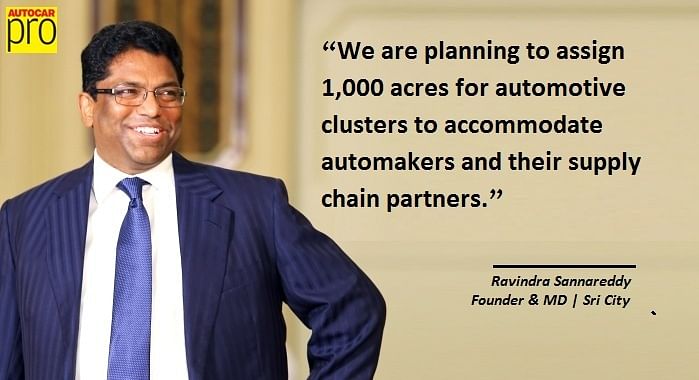
We also have to deal with local people as their lives are witnessing a change. They are used to the rural economy, which is now becoming industrial, and there is always a conflict between development and people.
Our policy is to offer jobs first to the local people but skills are a challenge as this is the most backward area of Andhra Pradesh. Before we came to this region, there wasn’t a single degree college. We have had to skill people and slowly get them into industrial jobs, which is a big challenge. However, despite these challenges, we have demonstrated that it is possible to create a world-class infrastructure and eco-system.
How is the overall labour situation in Sri City and do you have skilled and unskilled workforce available in the state?
The availability of labour in Sri City is abundant and there is a large number of skilled and unskilled workforce. There are also several engineering colleges in the locality to facilitate the manufacturing sector, especially the automotive industry. We have the Sri City HRD Academy, which looks into manpower training and recruitment to suit industry needs in Sri City. There is also the TVS Training Institute and Skill Development Centres to meet workforce requirements.
What is your growth vision for Sri City for the next five years?
We have certainly brought the best industries to Sri City and they have started manufacturing activities with more than 25,000 people working at present.
In the next five years, we want all the employees to live in Sri City and provide them with the necessary infrastructure. We want Sri City to be the best industrial zone and a smart and green city with sustainable growth. As per our plan, once the city gets completed, there will be a total of 100,000 to 120,000 direct jobs, around Rs 80,000-100,000 crore worth of investments and 200,000 people living in and around Sri City.
This story was first published in Autocar Professional's 12th Anniversary issue. Subscribe to our magazine to get exclusive news, features and analysis.
RELATED ARTICLES
INTERVIEW: "EV Demand is Rebounding both in India and Around the Globe" - JLR's Rajan Amba
Jaguar Land Rover India MD Rajan Amba discusses the India–UK FTA, the company’s manufacturing plans, the upcoming Panapa...
TVS Celebrates 20 Years of Apache, Eyes Premium and Global Push
Marking two decades of its flagship performance brand, TVS Motor unveiled special anniversary editions on Saturday while...
Q&A: Mahindra's Nalinikanth Gollagunta on Upcoming Festive Season, 'Bold' Design Choices
Automotive Division CEO Nalinikanth Gollagunta says mid-teens growth is achievable with Roxx ramp-up, BEVs, and a resil...






 By Kiran Bajad
By Kiran Bajad
 15 Jan 2017
15 Jan 2017
 19225 Views
19225 Views







 Darshan Nakhwa
Darshan Nakhwa


